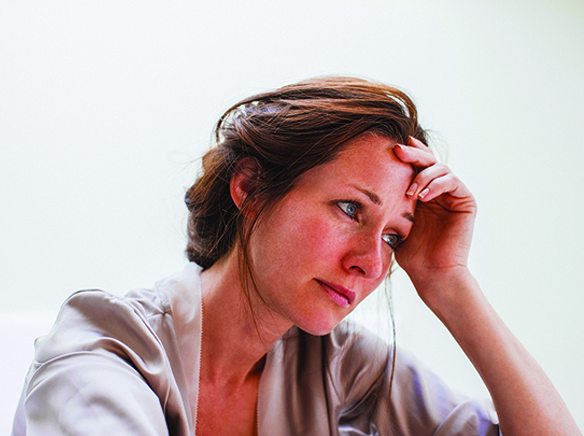With COVID-19, due to lockdowns, social distancing, all those restrictions put in place to prevent the spread of disease, bereaved people may not have found that their needs for grieving were met. Their need to grieve was unattended to. People were separated from their loved ones at the end of life. Hospitals were not allowing people in when someone was dying. Nursing homes had restrictions of visitations when people were at end of life, said Sharp HospiceCare Supervisor of Social Services Laura Grayson, MSW. Grayson said the other component of COVID is that people died who we did not expect to die. “We know that cancer takes life. We know aging takes life, but COVD came, and we have had more than one million deaths in the U.S. alone and more than 5,000 in San Diego County,” she said. “Many of those lives were young, healthy, ones that one never would have expected to pass. Because of the unexpectedness and trauma attached to that, it also complicates their grief. It goes way beyond terminal illness, people being frail and elderly who are dying. It is taking everybody and anybody.” Grayson said nobody is safe. “The level of the unknown and the lack of safety around that, the lack of certainty of who could die, my husband lost three family members due to COVID. Three people in one family unit, all within a year,” she said. “There is also compounded loss happening because so many people are being affected by this.” Grayson said in a society where we are already not as attentive to death and dying as some other cultures, COVID really set us back. “We had people unable to be there at the time of their loved ones passing,” she said. “We had people who were unable to hold funerals because of all the restrictions with public gatherings. We had people during their death who did not have their symptoms managed well because of the lack of resources in our healthcare system. That can complicate the survivor’s guilt knowing that their loved ones were alone, and their symptoms were not managed well. Those feelings of guilt because of not having access to them, not being available, not being able to support, complicated grief after somebody dies.” Grayson said added social stresses of the pandemic complicated lives on top of the mourning they experience. A sense of powerlessness, hopelessness, social stresses such as unemployment, financial distress, the childcare issues that wreaked havoc over the nation, schools closing, and isolated families. “All this makes grieving that much harder,” she said. “COVID has had such an impact on our community for those who have experienced a loss.” Grayson said it is extremely important to understand the difference between grieving and mourning. “If one can understand that grief is normal and a natural reaction to loss, or to change of any kind, that in itself creates a greater level of resiliency,” she said. “We must realize that grief is the internal process of our loss. It is the internal thoughts and feelings we have when somebody we love dies.” Grayson said grief is the container that holds your thoughts and feelings, the images of experiences that you had with your loved one, so grief has all the internal meanings that are given to firsthand experiences of loss. She said people need to recognize the difference between grief and mourning. “Grief needs the process of mourning in order to come to terms with our loss,” she said. “Mourning is when you take your grief experience, the internal process, and you express it outside of yourself. It is the external release of all our thoughts, feelings, our memories.” Grayson said this process looks different for each person. It can be talking to someone, allowing yourself time to cry, tapping into your spirituality, going to grief groups, going to counseling, journaling or writing about your experiences. “Without being able to move those feeling outside of ourselves, what happens is that the emotions of grief can go underground,” she said. “That can cause disenfranchised grief. We must realize the purpose of mourning is to provide the bereaved with the courage and confidence to start integrating the death of someone you know into your life. Through that integration is where we heal.” Grayson said healing is not getting over loss, as the chances are that a person never will. “Your life has been changed. You are going to be a different person because of it,” she said. “But instead of having grief be your life, which is what happens after the death, integration is the ability to be in life with your grief.” Grayson said disenfranchised grief, if people are not finding a process to mourn, usually happens if people do not have public support of loss, people acknowledging their loss, and that loss and feeling that comes with it are invalidated. “This causes us to be cut off from compassion, from support,” she said. “With this, is the diminished opportunity to freely express yourself. When the bereaved suppress their grief, it starts to cause problems that manifest in other ways. Depression, anxiety, physical symptoms. Finding support and expressing ourselves is so important to our overall health after we had a loss of a loved one.” Grayson said loss, and fear that comes with the recent mass shooting at an elementary school, affect children’s sense of safety, when it comes to grieving it is important to allow children to pace their responses, adults to follow their leads, and to answer them honestly and respectfully in an age appropriate manner. “One of the things that children are experts on is that they are so skilled at being in touch with their feelings and they also know when their feelings become overwhelming,” she said. “They do what we call dosing. When it feels safe and comfortable, they will talk about their feelings. They let adults know they are having a difficult time. Sometimes that is through behaviors instead of words, so adults must be observant of the behaviors of their children and what the underlying message is behind that.” Grayson there are times with children where it becomes too much and they do not want to feel it, it is not good for them to feel it, and they move along with life as though nothing has happened. “They are ready to go to school, they are playing, and all these other things,” she said. “We must read where they are at. If they are in a place where they are disconnected from their emotions, honor that. Recognize that right now, this is a coping skill they are using, and this is where they need to be. Then you see an opportunity. They ask you a question. They are expressing emotions. Their behaviors are telling you that they need help. That is the opportunity to sit and ask them questions, talk to them, and find out what is going on.” Grayson said many adults try to protect children by giving them “half-truths,” avoiding topics, minimizing what has happened, and what adults do not realize is that children can “read a room” so well. “They can tell something is wrong. They can tell when adults are worried. They know this person has died. They will follow our queues if we are not talking about it, and that means that they are suppressing their loss. Because they are protecting us.” she said. “That means that they are not given the opportunity to mourn because the adults are not creating a safe enough environment to allow them to do that. If a child is more concerned about the adults than what they are dealing with, it delays their psychological and emotional development. They must put their own childhood needs on hold. They will not be developing into well-rounded adults.” Grayson said the same goes for mourning. If adults are not creating a safe place for mourning, children will stifle their feelings, feel disfranchised, and have an unresolved emotional suffering with them until they are able to begin addressing it. She said this problem can lead well into adulthood, so adults helping children grieve and mourn is extremely important in their emotional and psychological development. “Allow them to do this in real time and do not delay it, and they will not have to deal with it later in life,” she said. “It stunts your emotional growth. Your ability to have relationships, to love freely, to trust. Unresolved grief has a lot of impact on people. Children can experience anxiety and depression, just as well as adults.” Grayson said there are many ways for people to focus on their own coping, to improve their resilience during this time. “Most important, give yourself permission to feel whatever you are going to feel,” she said. “Know that your grief emotions are normal, and they are to be expected. Too often, we tend to be too hard on ourselves. We judge ourselves. We compare ourselves to other people. We think grief should go faster than it really does. Your feelings must be felt, and your feelings must be released. That is part of mourning.” Grayson said turn to others for support making sure you find ways to release your emotions. “By turning to others for support, it is giving us permission to ask for what we need,” she said. Grayson said so many times when people ask what we need, the answer is, “I am fine,” when what we really need is someone to listen, or a distraction on days and times that were good memories with people we have loss, or you might have a hard time cooking for yourself. “Be that specific and let people know what you do need and allow them to care for you in that manner,” she said. “To help with your coping, take charge wherever you can. If you think about how much of our life is out of our control, especially with the impact of this pandemic, it is important for us to recognize that with this loss, my life has changed forever. It is not going to be the same. I am not going to be the same. When one comes to terms with that, you then can look at things that you are able to control and make decisions about those things in a way that will benefit yourself.” Sharp HospiceCare offers support and counseling groups that are open to the community, even those who are not part of the Sharp Healthcare plan. “Our bereavement support groups are open to anyone in the community who has experienced the death of a loved one,” said Grayson.













